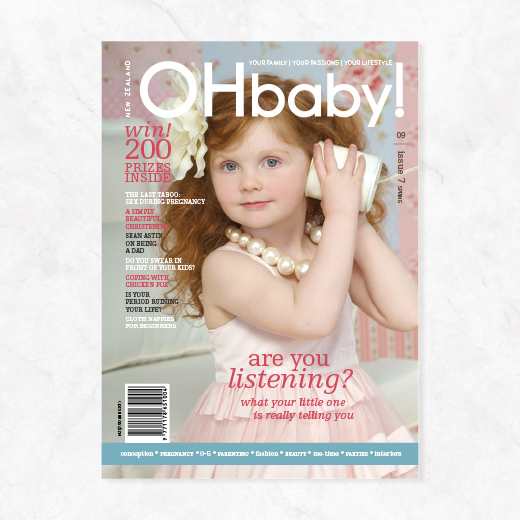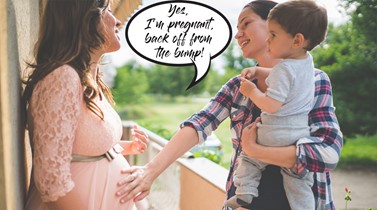Making new friends after baby arrives

Does the thought of attending a new coffee group or playgroup make you nervous? Life coach Tina Coombes shares some tips for starting off on the right foot.
With the onset of children comes, for many of us lots, of new faces and the possible loss of old familiar ones. The vivid vision of sitting in a large circle surrounded by new faces during our antenatal classes still makes me feel uncomfortable.
What I didn't know at the time was that this was just the beginning of many new people entering our lives. Coffee groups, baby yoga classes, Plunket courses, music and swimming classes... No matter how hard you might try, you will keep meeting the same faces: Mothers also in the same situation as you, on maternity leave or no longer working, discovering this new thing called parenthood. I'm not going to promise you'll make life-long friendships or find your "new best friend", but what I will offer is sound advice on how to manage meeting new people and different techniques to help build rapport quickly and easily.
To meet new people, it is fundamental that you take as many opportunities as possible to be in those environments where you will meet other mothers with children of a similar age to yours. However hard it might be to leave the house, aim to do at least one event a week. Once you have mastered your weekly outing, build it up to two events a week. Before you leave for a social engagement, prime yourself with some gentle words of encouragement.
So here you are in a room full of strangers, what next? How can you get off on the right foot with the mother sitting next to you? Try to be upbeat and show how pleased you are to meet her, keeping your mind and your smile open. For some of us, meeting new people can come very naturally, but for the majority of us, we might need a few tricks up our sleeves.
Good openers
If you want to make a connection with someone you don't know, steer away from the classic, "What do you do?" or worse still, "What did you used to do?" This can be a sensitive question, especially for mothers who could be facing many difficult decisions regarding if or when they will return to work. Try not to boast, as it on reveals your own insecurities. Keep away from teasing until you have gauged someone's sense of humour. So what does it leave? Lots of opportunities for different topics to use as bait to catch the attention of the other participants. Try to use open ended observations and questions.
Focus on being interested
This is a key skill for building rapport with someone we have only just met. One of the best ways to be interesting is to be interested in the other person. Control your own self-talk (the part of you that desperately wants to tell your story) and focus on the person you are with.
Ask open-ended questions
A question that lets a person answer in many different ways will help direct the conversation to what's important to them. Examples could include, "How did you go about solving your baby's reflux?" "What would you do differently next time?", and the ultimate open-ended question, "How does this make you feel?"
Compliments
Compliments are definitely a way to start a conversation. Assuming you use them wisely and they are not too personal, elaborate or improbable, this can be a great approach to building rapport. Building rapport and common ground can start simply with a mutually flattering exchange, as in, "That's a great nappy bag".
Empathy
The ability to empathise is the foundation for effective understanding and communication. Being able to understand but also to step back and achieve a detachment from one's own emotions is essential for building effective and constructive relationships. It aids in the development of ideas, solving problems and avoiding or diffusing conflict.
What to avoid
Batting your eyelids, itching and winking are all signs of nerves and need to be kept under control. In addition, strange behaviour like inspecting someone's clothes won't help generate rapport and will only lead to them feeling uncomfortable. Another classic is if you think you have met before, but can't remember the person's name, offer yours. "I remember you, but I'm hopeless with names…"
Strong opinions
To some, voicing a strong opinion can be very amusing and a great way to spice up a conversation. However, when you first meet someone, it is best not to rush in with your views (even if exaggerated for effect), as you may cause offence. Once the courtesies are over, trade information and follow this with opinion, eventually leading to feelings. This gradual approach will ensure that everyone's views are considered and respected.
Keep listening
Most people don't actively listen to others, they take turns speaking and are more interested in announcing their own views and experiences rather than really listening and understanding others. Listening is by far the most important of all communication skills. It doesn't come naturally to everybody and many of us will need to work at developing this skill. Listen!
Sometimes we are guilty of formulating the next question without paying attention to the answer to the first. You miss great opportunities for follow-up questions if you do this! Make an effort to listen to the answer you asked for, thus reinforcing your interest in the person.
Being interesting doesn't mean you have to be the most talkative person in the room. Pacing the conversation so that you don't appear to be desperately in need of someone to talk to is fundamental.
An over-talkative and over-eager person can cause others to run a mile in the opposite direction. Be approachable and friendly, and you will find people will gravitate towards you.
Relax and be yourself
People lean towards those that are well-centred and friendly. By projecting positive feelings about ourselves we put others at ease. This doesn't mean boasting, it just means being yourself. Being warm, open, responsive, and kind will always attract others to you, without having to say too much at all.
For those who are reasonably confident in new social situations, and for whom attending a new coffee group holds no great fears, there's still the niggling worry about whether, when you leave, you will have made enough of an impression on anyone for them to want to see you again. Deeper relationships take time to form. Aristotle, the first philosopher to define
friendship, characterised it as "mutually shared goodwill".
Aristotle said, "The desire for friendship comes quickly. Friendship does not." He followed on with identifying three main types of friendships:
• Utility friendships: This kind of friendship results from doing something together. The classic example is working together on the same projects and tasks. Often when you take the work away from these friendships, they tend to founder too. Many of us might have noticed this happen to the friendships we forged in the office before leaving to have children.
• Pleasure friendships: This is the kind of friendship which forms from common interests like sports, shopping, children, or one of the children's activities. Like utility friendships, if the shared activity ceases, then the friendship often dissolves too.
• Excellent friendships: These are the real gems, the friendships which are not dependent on something else. Often, excellent friendships are the ones that stand the test of time. Forging friendships can be hard work, but it can also be fun and interesting. The most important thing to remember is that friendship is a two-way street. You have to be prepared to give and take. All the "how to build rapport" tips outlined above are also valid for forging friendships.
Friendships are like cars: They need regular servicing to keep them in good order. Here are additional tips for maintaining friendships:
• Take equal responsibility for the friendship. All parties involved in a friendship should learn to take responsibility for the friendship. It is like the unwritten rule with regards to play dates with your children, it shouldn't always be at one persons home.
• Keep personal information confidential. It's really important that as you feel more and more comfortable with your friend, you will find that you talk more and share lots of personal information. It's important to make sure that you both have a mutual understanding that anything personal the two of you discuss is absolutely confidential. Gossip ruins friendships, especially if about it stems from personal and private talks that you've shared in confidence.
• Have a good time. Make sure that you spend time with your friends doing lots of fun, interesting things together. Sadly often friendships get "weighed down" if all you ever do is talk about each other's problems. Find time to do things with your friends like a movie, a day at the spa, or a shopping trip.
• Stay in touch. Keeping up regular contact with your friends is by far the best thing, even when things are going well; friends are not just for bad times. Give them a call or send them a note or email. Making regular contact with will show that you are committed to the friendship.
It is amazing to think that every new coffee group, solids talk, mother's group, and baby sign language class has the potential to lead to new friendships. Whatever type of friendship it will become is dependent on you and the other person. The vital thing is to put yourself out there and meet as many new people as possible. And the wonderful news is, in amongst the crowds will be your new friends.
Tina Coombes is an Auckland life coach. Her practice, Alta Performance, coaches women through the emotional challenges that having a baby brings.

AS FEATURED IN ISSUE 7 OF OHbaby! MAGAZINE. CHECK OUT OTHER ARTICLES IN THIS ISSUE BELOW

















